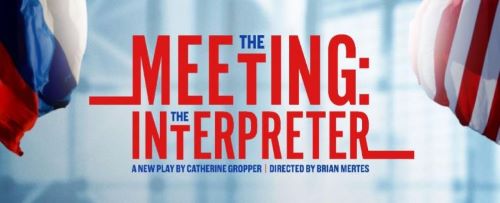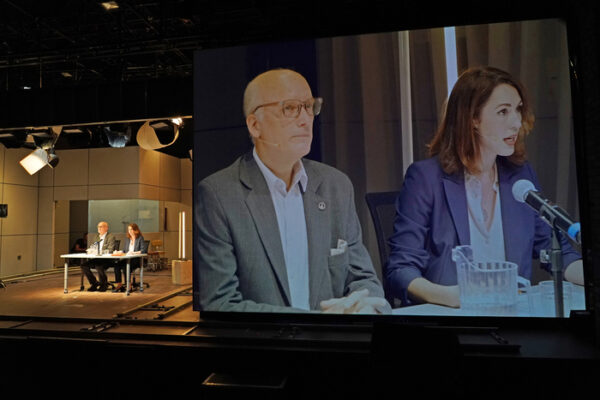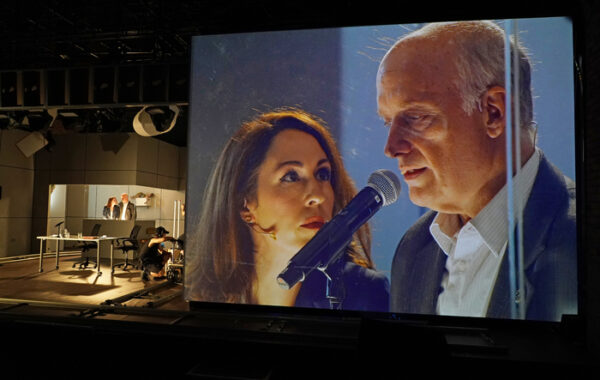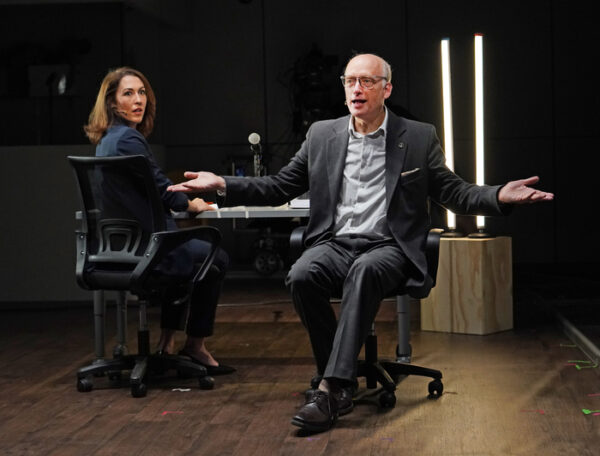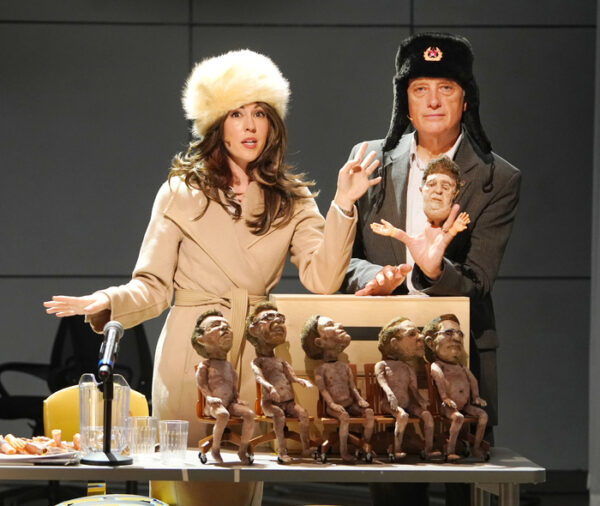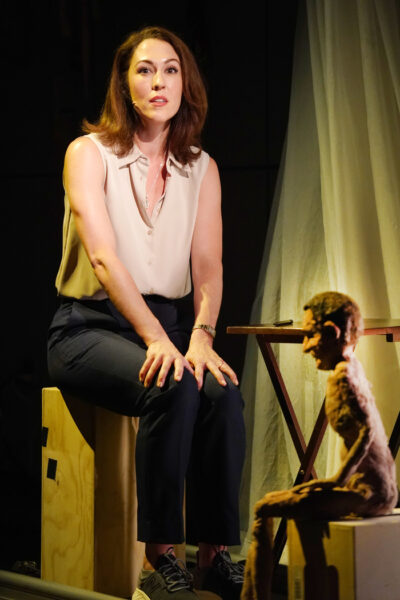A MEETING THAT’S TOUGH TO INTERPRET
Four months before the November 2016 presidential elections, a crucial meeting took place at Trump Tower between Trump’s son, Donald Trump Jr.; Trump’s son-in-law, Jared Kushner; Trump’s campaign manager, Paul Manafort; British publicist Rob Goldstone; Ike Kaveladze, who worked for Russian oligarch Agalarov; Rinat Akhmetshin, a former Soviet counterintelligence officer; and Russian lawyer Natalia Veselnitskaya, accompanied by an interpreter she had hired for the day to help her with translations. Trump Jr and Kushner were there to acquire damaging information about Hillary Clinton (a white plastic folder was mentioned more than once) but no words in the meeting were about collusion or specifically about such information.
The Meeting: The Interpreter, a new play by painter, sculptor, and playwright Catherine Gropper, directed by Brian Mertes, which opened last night at the enchanting Theater at St. Clement’s, looks at that June 9th meeting through the eyes of the Interpreter, an honest man doing an honest job thrown into the midst of Russian interference in the American presidential election. Interpreter’s professional duty is to hold in confidence any privileged information entrusted to them during their work hours, so the play’s dialogue is mostly taken from the grueling never ending congressional hearings and senate interrogations the poor man had to go through because of that disturbing get-together. Gropper met him, she felt his wound and she was able to transfer that pain to her play.
The Interpreter (Tony-winner Frank Wood) was born in Russia, studied in Washington, became an American citizen and a top-notch interpreter. Veselnitskaya was just one of many, many clients. She was lobbying against the Magnitsky Act, a law that authorizes the U.S. government to sanction foreign government officials who are human rights offenders, freeze their assets, and ban them from entering the U.S. Sergei Magnitsky was a Russian 37-year-old tax lawyer who investigated a $230 million fraud involving tax officials. Instead of being promoted, he himself was accused of fraud, thrown in prison and, after eleven months, he was found dead. The worldwide law was made in his honor; lifting the Magnitsky Act was on the other side of the transaction proposed at the meeting. Wood credibly shows the interpreter’s humanity, his vulnerabilities, his disdain, the guilt and fear he felt once he understood what was going on, and the torturous period that followed.
Kelley Curran plays a journalist, Natalia, an FBI Agent, three different Congressman, an aide and a staffer, switching roles with total ease and confidence. Aside from the Interpreter and Natalia, the other people in attendance at the meeting were represented by puppets, with big heads and very expressive faces, created by master puppet designer and maker Julian Crouch. One puppet is lying like a dead Christ in a cardboard bankers box placed on a wall-mounted shelf; only later do we find out that it’s Magnitsky.

The staging by Jim Findlay is striking; at the beginning, a large screen shows close ups of a journalist interviewing the Interpreter before moving to the side and revealing the full picture. The set contains a few elements, two chairs, a table, an interpreter booth in the back, all surrounded by a circular camera dolly-track. A cameraperson, on the dolly, films close-ups of the actors throughout the play, adding effects, changing the moods, and it was all shown on the large screen, a creative choice by Mertes flawlessly executed by projection designer Yana Biryukova, director of photography Tatiana Stolpovskaya, and lighting designer Barbara Samuels.
Choreography by Orlando Pabotoy, costumes by Olivera Gajic, and Daniel Baker’s sound design were all imaginative and on point but the rhythm of the play as a whole was off; at the beginning the dialogue was really fast, to establish the chaos our main character was forced to endure, but it became so fast it was hard to follow, too many repetitions and useless facts, just a barrage of information flying at us; when it slowed down, it became too slow before coming back up: it needs tuning. It’s tricky to put a complicated political scandal on stage. J.T. Rogers’ docudrama at Lincoln Center about Rupert Murdoch, Corruption, attempted this. The Meeting: The Interpreter is more creative than Corruption, more theatrical, but definitely less clear.
photos by Carol Rosegg
The Meeting: The Interpreter
Theatre at St. Clements, 423 West 46th St
Wed and Thurs at 2 & 7:30; Fri at 7:30; Sat at 2 & 7:30; Sun at 3
ends on August 24, 2024
for tickets, visit The Meeting
